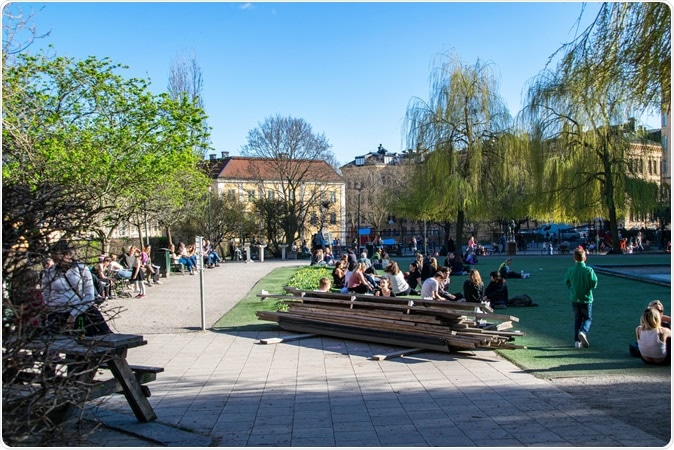A number of groups in Sweden, including public service broadcasters Sveriges Television (SVT), and Sveriges Radio, are providing their country with the latest coverage of the coronavirus situation. A new survey shows that 80% of Swedes have moderate to high levels of trust in the public reporting and their government officials.
Sweden has suffered a heavy blow from the coronavirus pandemic. Almost 17,000 people in this small Scandinavian country been infected with the severe acute respiratory syndrome coronavirus 2 (SARS-CoV-2), while over 2,000 have died from COVID-19 disease caused by SARS-CoV-2. Lockdown measures have not been enforced in Sweden, unlike its neighbor Denmark, which has reported less than half the cases and about 400 fatalities.
Nonetheless, the Swedish have significantly higher and growing confidence in the official communications on the situation compared to other broadcasters, shows a recent study conducted by the Swedish nonprofit VA (Public and Science). The study was conducted in collaboration with the Karolinska Institute and Södertörn University.
The survey was carried out by Kantar Sifo, comprising 1,200 interviews performed by an online panel on a random sample of people, between April 2-5, 2020. Suitable adjustments were made for age, gender, and location when extrapolating it to the general population.

Stockholm / Sweden - April 21, 2020: Swedes outdoors enjoying spring weather during coronavirus pandemic, at a popular square called "Nytorget" at Södermalm. Image Credit: Susie Hedberg / Shutterstock
How to manage the crisis
A lot of discussion in recent weeks has been taking place on how Sweden dealt with the infection crisis, especially when compared to other countries. Several different approaches have been taken by governments in different regions so far, ranging from total lockdowns in Australia, India and the UK, to mere advice on social distancing and handwashing in some US states. There is not yet a consensus on the best way to meet the situation.

Confidence in public reporting
The investigators focused on understanding how the population in Sweden receive and interpret information disseminated about the coronavirus and the worldwide spread. This is the second survey taken so far.
Sveriges Television (SVT) garnered a confidence vote of 83% in the survey, while Sveriges Radio (SR) had 78%. The highest percentage was among people 65 years or over, at almost 90%, though it was almost the same for SR.
The divide is along partisan grounds, with 95% of strong SVT supporters being Left Party adherents. On the other hand, those who say they have low confidence in the SVT support the Sweden Democrats, the national conservative party.
The daily newspaper for which the highest level of confidence was reported was Dagens Nyheter (DN), at 49 percent), followed by Svenska Dagbladet (SvD) at 45 percent). Close on their heels were the local morning newspapers (42 percent).
Evening tabloids like Aftonbladet and Expressen were generally not considered dependable, with only 25% and 20% of Swedes expressing their confidence in their reporting. An earlier survey, however, showed that more Swedes learned about current happenings concerning the coronavirus from these tabloids rather than the mainstream newspapers.
In short, the evening tabloids are not trusted but provide readable nuggets of information on the pandemic.

Growing trust in the government
The survey also showed that Swedes trust the information issued by doctors and other healthcare professionals and researchers relative to other professional newsgroups and commenters. On the other hand, the second survey also showed that the percentage of people who said they trusted government officials went up by 12 points from 60 to 72 percent.
While all ages expressed this increase in confidence, the most marked change was among older people aged 65 years or more. Here, the increase was by 21 points, from 58% to 79%. When it came to trusting journalists and politicians, the same trend was seen, though the rise was less marked.

Disagreements among professional groups
Health and other professional groups occasionally voice their discordant points of view when it comes to the way the government is dealing with the crisis. The survey reports that, nonetheless, 85% of Swedes think there is reasonable agreement among doctors and other healthcare professionals about the course of management.
Agreement among government officials was more significant, in the public mind than among researchers, at 78% vs. 73%. A fifth of Swedes thought that there was considerable disagreement among researchers, however.
Journalists were perceived to have the most significant disagreement, with only 40% of Swedes saying they felt this group was more or less in harmony about how they thought the government was coping with the situation.
Further studies
More studies will be carried out while the pandemic lasts to identify and track changes in how the Swedish people receive and respond to media reporting. The content of such reporting will also be analyzed to see how it changes with the phases of the pandemic, and how this is linked to changes in the way people see the same events over time.
Source:
Vetenskap and Allmaenhet (2020). Coronavirus in the Swedish media - confidence in government officials is growing. https://www.alphagalileo.org/en-gb/Item-Display/ItemId/191625